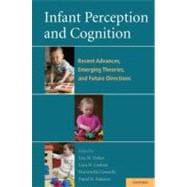
Note: Supplemental materials are not guaranteed with Rental or Used book purchases.
Purchase Benefits
What is included with this book?
| Contributors | p. xv |
| Varieties of Attention in Infancy | p. 3 |
| Infant Attention, Arousal, and the Brain | p. 27 |
| A Constructivist View of Object Perception in Infancy | p. 51 |
| Development of Specialized Face Perception in Infants: An Information-Processing Perspective | p. 69 |
| The Role of Perceptual Processes in Infant Addition/Subtraction Experiments | p. 85 |
| Perceptual Constraints on Implicit Memory for Visual Features: Statistical Learning in Human Infants | p. 111 |
| Computational Modeling of Infant Concept Learning: The Developmental Shift from Features to Correlations | p. 125 |
| Information-Processing Approaches to Infants' Developing Representation of Dynamic Features | p. 153 |
| Infant Spatial Categorization from an Information Processing Approach | p. 179 |
| The Role of Auditory Stimuli in Infant Categorization | p. 203 |
| The Development of Categorization and Facial Knowledge: Implications for the Study of Autism | p. 223 |
| Emerging Competence with Symbolic Artifacts: Implications for the Study of Categorization and Concept Development | p. 261 |
| Author Index | p. 285 |
| Subject Index | p. 293 |
| Table of Contents provided by Ingram. All Rights Reserved. |
The New copy of this book will include any supplemental materials advertised. Please check the title of the book to determine if it should include any access cards, study guides, lab manuals, CDs, etc.
The Used, Rental and eBook copies of this book are not guaranteed to include any supplemental materials. Typically, only the book itself is included. This is true even if the title states it includes any access cards, study guides, lab manuals, CDs, etc.